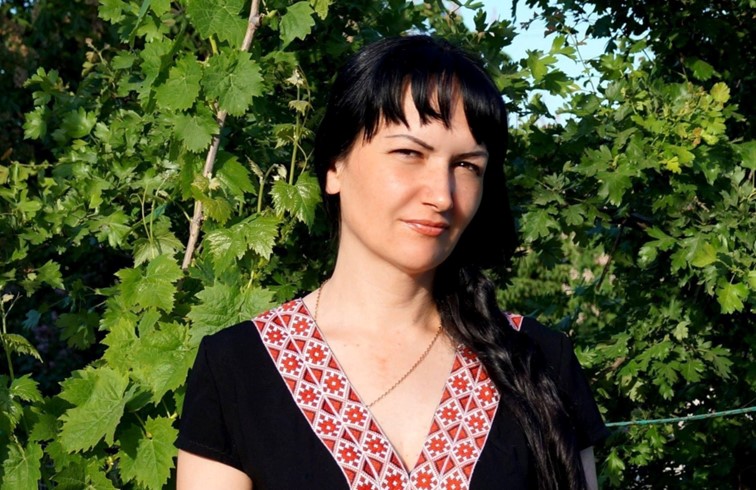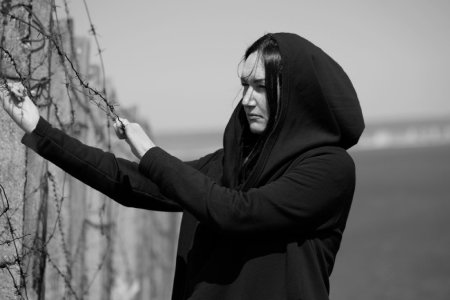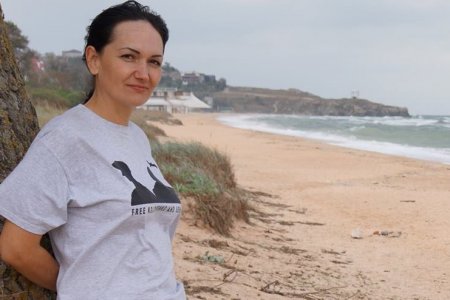
Crimean Realities reported on 15 November that ‘investigator Timofeyev’ from the Russian ‘military investigative committee’’ claimed to have found no infringements in the FSB’s treatment of Danilovych. This is despite several evident contradictions in their story, and its sheer improbability. The FSB had to explain, for example, why, if they claimed to have had grounds for bringing charges against Danilovych, she should only have been officially charged and detained on 7 May, eight days after she was seized at a bus stop as she was making her way back from work and disappeared.
The FSB assert that three officers, one of them Yury Chevalkov, ‘discovered’ Danilovych at the bus stop. Since they allegedly suspected her of collaborating with Ukrainian military intelligence, they stopped, with Chevalkov showing his ID and saying that they were carrying out ‘an investigative measure’. No explanation is provided of what this purported ‘measure’ was supposed to be, yet it is claimed that Danilovych agreed to go with them. This version also fails to explain why a search was carried out, essentially simultaneously, at the home Danilovych shares with her parents, and why her family and friends were told that the enforcement bodies knew nothing about her whereabouts.
The FSB assert that they first took Danilovych to Feodosia, where another employee Ruslan Narimanov is supposed to have searched her items and ‘discovered’ the homemade explosive device (alleged to have been found in her glasses case.) Danilovych was supposedly told that she needed to go with them to Simferopol, and she ‘agreed’. It is then asserted, that of her own volition, she signed a piece of paper saying she had no objections about the FSB’s behaviour. She further “agreed to take part in investigative measures for an unlimited amount of time’.
This nonsense is supposed to have continued from 30 April to 6 May, with it claimed that she was at the FSB premises ‘voluntarily’, with a bed, a shower, food, and other necessary items. The FSB claim that she could have left at any moment, but ‘decided to remain’ for want of a place to stay in Simferopol. This directly contradicts the FSB’s own claim that the alleged ‘explosives’ were found immediately. If she has been in custody ever since because of the alleged find, why would she have been free to leave for the first eight days? If she was not free, then why were there no official charges until 7 May?
During this near ‘holiday’ in the FSB premises, Danilovych is supposed to have faced only questioning by FSB officer Oleg Savchenko, with no physical or psychological duress purportedly applied.
This alleged check by the Russian ‘military investigative committee’ cites only FSB officers, and a video, while Danilovych was entirely under their control, where she states that she has no complaints about her treatment. Timofeyev did not question Danilovych, and neither she nor her lawyers were informed of the results of this ‘check’ before it was meant in ‘court’.
There are numerous other discrepancies, including the assertion by prosecution witness Danil Samokhin that he was present at the alleged first search of Danilovych’s items. Samokhin was clearly brought in to ‘confirm’ the FSB claim that the explosive was found at the beginning. The problem is, however, that Samokhin had stated earlier that Danilovych was already in handcuffs, which she should not have been if the FSB’s story had any credibility. The video footage shown in ‘court’ is also evidently of Danilovych being forcibly seized and pushed into the FSB vehicle, not of ‘voluntarily agreeing to go’.
Danilovych’s account of her experiences has been absolutely consistent since she was finally given access to an independent lawyer 13 days after she was taken prisoner. She insists that she was not ‘detained’ on 29 April, but abducted, and that any signatures and denial of complaints about her treatment were obtained through
During the previous hearing on 30 November, she described her treatment in detail. She had never been in the FSB premises in Feodosia, as claimed, with the protocols of detention having been drawn up later. She had never seen any of the documents which she had ‘signed’ as blank pages under threat that she would be killed if she did not.
She had been returning on 29 April from her work at the Malakhit Medical Centre in Koktebel. She had arrived at the bus stop at 9.30 a.m., and a car with four men inside, three wearing balaclavas and in camouflage gear, stopped. The fourth man, whom she now knows to have been Yury Chevalkov, did indeed get out and wave some kind of ID, before insisting that she come with them, claiming that this was merely ‘for a chat’, and that no summons or warrant was therefore required. Danilovych’s work as a civic journalist, including for the human rights initiative Crimean Process, meant that she had ample knowledge of FSB abductions, resulting either in a person disappearing forever, or being found later, having suffered savage torture. It is quite clear, both from her account, and from the video footage, that she did not go ‘voluntarily’ with the FSB men. When, in the car, she asked Chevalkov to show a warrant, he refused and told her, rudely, to shut up and sit quietly “if you want to live”.
Chevalkov got the driver to drive into a field, where they used physical force to take her bag and an extra plastic bag away from her. When they found her mobile phone and tablet, Chevalkov made a phone call, telling the person at the other end “to go in”. Iryna says she understood then that “the second half of the gang had come to my home”.
She was taken to Simferopol. She asked Chevalkov a second time why they were abducting her and what they wanted from her parents. His only ‘answer’ was to again tell her to shut up or they would take her to a forest and bury her.
Chevalkov put a bag over her head as they got close to the FSB building, and this was how she was taken inside the building.
She identifies the men in the FSB office with her as Yury Chevalkov; Oleg Savchenko and Sergei Suvorov. They then brought in an FSB female employee and Ruslan Narimanov. The latter had a video camera with him which was going even while the woman carried out the search. As well as other items, the female employee stated that she was opening the glasses case and that there were glasses inside. Nowhere, at that stage, was there any mention of the alleged ‘explosive’; of a broken needle; and battery which the FSB later claimed to have found.
She was then taken, again with a bag over her head, to a room without windows, which Chevalkov said was the basement. He began asking her questions which effectively confirmed the suspicion that Danilovych was targeted for her civic journalism and her blog which highlighted the occupation regime’s violations in the medical sphere, especially during the pandemic.
He later left and then returned, together with Suvorov. Both men then threatened reprisals against her elderly parents if she didn’t cooperate. They used both physical force and psychological forms of pressure. When she asked for her phone to tell her parents where she was, so that they didn’t worry, and her employers that she wouldn’t be in, Chevalkov just laughed, and said she wouldn’t need her job anymore. He told her that she should be worrying about how to get out alive from this basement, and that it was unlikely she would.
The following day, the above-mentioned men returned, together with five others in balaclavas and continued both interrogating and threatening her, if she didn’t tell them all she knew about all independent journalists in occupied Crimea. They were particularly interested in Crimean Tatar journalists (and also asked about the important Crimean Solidarity human rights initiative.). All three of the identified FSB threatened to kill her if she their lie detector decided she was not telling the truth. One of the men in balaclavas also came up from behind and began suffocating her. She was held in a very cold cell, without proper food (which she was, in any case, wary of eating) and without being able to use a toilet. There were occasional sessions of interrogation, with the questions about alleged cooperation with other countries security services, and similar. These continued until 4 May when the lie detector person claimed that she had ‘passed’ their test and that she would be released the next day, after they sorted out all the documents.
After the initial search, until 2 May, she had her bag with her. This was then taken away, and she immediately asked why, understanding that it could be to plant something. She was, unfortunately, right. On 5 May, Chekalkov and another man appeared and started insisting that she sign a statement saying that she had agreed to the ‘investigative measures’ Later, a female FSB employee, Yulia Samorodova appeared for the entirely illegal procedure, with the use of force and threats of reprisals, to obtain hand swabs and fingernail cuttings. Such methods, it should be said, have long become part of the FSB’s repertoire for falsifying criminal charges. On 6 May, she was forced to sign three or four pieces of A4 paper, again being told that “if you want to live, sign it without a word”.
She signed. Savchenko then, however, told her that is she wanted to save her life, she should denounce Suleiman Kadyrov (a Crimean Tatar civic activist and also the victim of political persecution), that they were “sick of that Tatar mutt” (and worse racist abuse). She refused.
The same methods of terror were used to force her to say before the video camera that she had chosen to be there and that no physical or psychological pressure had been applied. When she tried to resist, Chevalkov threatened to keep her in the basement permanently, saying that he could organize that if he wanted, and if he didn’t – they’d take her to the forest (and kill her).
It was after they used such methods to obtain the video and signatures that they returned and claimed that they had ‘discovered’ an explosive device in her glass case. They just laughed at her outrage, before beginning to beat her again. She was then taken, with a bag over her head, to ‘investigator’ Alexander Lavrov, who handed notification of criminal charges over the supposed ‘explosive device’. Even then they prevented her from seeing her lawyer, Aider Azamatov, and tried to foist one of the ‘lawyers’ they appoint, who are generally there to do whatever the FSB demands and who pay no attention to torture and other illegal methods.
Iryna’s ‘trial’ has been underway at the occupation ‘Feodosia municipal court’ (before ‘judge’ Natalia Kulinskaya since 29 August. There is every reason to believe that the charges of possession of an explosive (under Article 222.1 § 1 of Russia’s criminal code) were only concocted after the interrogations failed to break her into ‘confessing’ to non-existent contacts with foreign organizations and ‘state treason’. Despite this and the clear evidence of grave falsification, Iryna could face a sentence of up to eight years.
Iryna Danilovych is one of at least 14 journalists / civic journalists facing persecution for her civic position and human rights work. Please see details of the appeal for solidarity below and help to ensure maximum publicity for her plight and that of other courageous journalists in occupied Crimea.
Ukrainian civic journalist faces 8-year sentence for exposing healthcare lies in occupied Crimea



